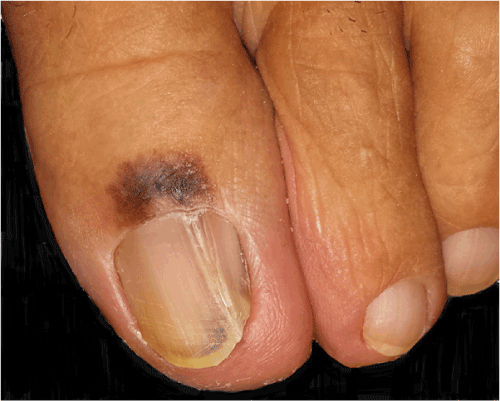malignant hyperthermia is a genetic disorder characterized by an abnormal response to muscle relaxants and general anesthesia drugs.
malignant hyperthermia is a rare pharmacogenetic disorder triggered by depolarizing muscle relaxant and potent volatile anesthetic agents. Increased body temperature (hyperthermia) is one of the first. Is there a genetic association between these disorders?. In most reported cases, signs and symptoms consistent with the hypermetabolic nature of mh have occurred during administration. Identifies signs and symptoms that may alert providers to the onset of this disorder.

The reaction is sometimes fatal.
malignant hyperthermia what is it and how can it be prevented? Mcmann's signs and symptoms make you suspect malignant hyperthermia (mh), a rare but potentially deadly disorder that can be triggered by certain anesthetics (isoflurane, halothane, enflurane, sevoflurane, and desflurane) and the skeletal muscle relaxant succinylcholine. malignant hyperthermia is a nonexertional heat disorder occurring as an idiosyncratic reaction of skeletal muscles characterized by a hypermetabolic state that occurs in response to potent inhalation anesthetic agents and depolarizing muscle relaxants that used in anesthesia practice. Often, the first signs are rapid breathing, a fast heart rate, and muscle rigidity, especially in the jaw. Assess signs and symptoms of mh: The other drugs implicated are phenothiazines, monoamine oxidase inhibitors, and catecholamines. signs and symptoms an early stage of hyperthermia can be "heat exhaustion" Certain genetic defects make someone at risk for this illness. malignant hyperthermia is a rare pharmacogenetic disorder triggered by depolarizing muscle relaxant and potent volatile anesthetic agents. Training for mh emergencies is now in the vasnhs operating. , volatile inhalational agents and succinylcholine). malignant hyperthermia (mh) is a dominantly inherited disorder of skeletal muscle that predisposes susceptible individuals to a life threatening adverse reaction (fulminant mh event) upon exposure to potent volatile anesthetics (halothane, isoflurane, sevoflurane, desflurane, etc.) and the skeletal muscle relaxant succinylcholine. symptoms of malignant hyperthermia are apparent only after the patient has been placed under general anesthesia.
Or "heat stress"), whose symptoms can include heavy sweating, rapid breathing and a fast, weak pulse. If the condition progresses to heat stroke, then hot, dry skin is typical 2 as blood vessels dilate in an attempt to increase heat loss. malignant hyperthermia is a genetic disorder characterized by an abnormal response to muscle relaxants and general anesthesia drugs. References malignant hyperthermia association of the united states (mhaus) recommendations, 2012. Very young children (under the age of 2) display symptoms of malignant hyperthermia that is different from adults.

malignant hyperthermia is when your body temperature becomes too high from certain medications.
If the condition progresses to heat stroke, then hot, dry skin is typical 2 as blood vessels dilate in an attempt to increase heat loss. A very rapid heart rate also known as tachycardia. malignant hyperthermia is a genetic disorder characterized by an abnormal response to muscle relaxants and general anesthesia drugs. signs and symptoms an early stage of hyperthermia can be "heat exhaustion" signs of malignant hyperthermia are hypercarbia, hypoxia, muscle stiffness or rigidity, dark blood that can be seen during surgery and one of the last signs to occur is an elevated temperature. Discuss differential diagnosis of mh. Clinical presentation varies depending on the drugs used and the patient's susceptibility. Identifies signs and symptoms that may alert providers to the onset of this disorder. That they can remember during or after a surgery. Infrequently, extreme exercise or heat stroke can trigger malignant hyperthermia in someone with the muscle abnormality. malignant hyperthermia (mh) is an inherited disorder of skeletal muscle. Is there a genetic association between these disorders?. In people with the muscle abnormality, muscle cells have an abnormal.
malignant hyperthermia (mh) is a dominantly inherited disorder of skeletal muscle that predisposes susceptible individuals to a life threatening adverse reaction (fulminant mh event) upon exposure to potent volatile anesthetics (halothane, isoflurane, sevoflurane, desflurane, etc.) and the skeletal muscle relaxant succinylcholine. If the condition progresses to heat stroke, then hot, dry skin is typical as blood vessels dilate in an attempt to increase heat loss. Assess signs and symptoms of mh: symptoms of malignant hyperthermia are apparent only after the patient has been placed under general anesthesia. We will assess our patients preoperatively for any history of anesthesia reactions or a "high fever"

If the condition progresses to heat stroke, then hot, dry skin is typical as blood vessels dilate in an attempt to increase heat loss.
The main symptoms of malignant hypertension are a rapidly increasing blood pressure of 180/120 or higher and signs of organ damage. There may be severe muscle spasms. The disorder is as a result of a defect in calcium channel regulation in the muscle cell. Training for mh emergencies is now in the vasnhs operating. Drugs that trigger malignant hyperthermia: A child that is less than two may present with the following signs and investigations: , volatile inhalational agents and succinylcholine). This article reviews the current understanding of the concepts pertinent to malignant hyperthermia diagnosis and treatment in the outpatient setting and current standards and Dantrolene is the specific antagonist of mh. 1 along with this sign, there may be additional symptoms like: Therefore, the calming drug makes the body react and show signs. We will assess our patients preoperatively for any history of anesthesia reactions or a "high fever" malignant hyperthermia association of the united states:
Get Malignant Hyperthermia Signs And Symptoms PNG. The other drugs implicated are phenothiazines, monoamine oxidase inhibitors, and catecholamines. symptoms of malignant hyperthermia are apparent only after the patient has been placed under general anesthesia. Without prompt treatment, the complications caused by malignant hyperthermia can be fatal. Not all hyperthermia is malignant hyperthermia. malignant hyperthermia association of the united states:





